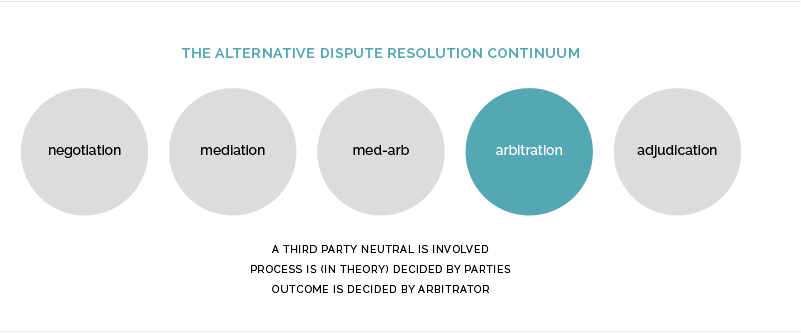
Arbitration
In arbitration, the parties to a dispute present their arguments and evidence to an impartial third party who acts as an arbitrator. The arbitrator will careful review the arguments and evidence and will render an award for one side. Arbritration can either be a legally binding proceeding that is non-applealable, or it can be a non-binding proceeding. Unlike mediation, arbitration is a more formal proceeding, with less control in the client’s hands.

At Centerpoint, the arbitration procedure is conducted by one of our trained and experienced neutrals and governed by our Rules of Arbitration. At the end of the arbitration hearing, the arbitrator will render a decision on the merits of the case.
TYPES OF ARBITRATION
Generally there are three broad sub-categories of arbitration: Binding Arbitration, Non-Binding Arbitration, and Mandatory Arbitration.
Binding Arbitration
The parties agree to waive their right to a jury trial and appoint an independent arbitrator who will render a decision that the parties are bound to abide by.
Non-Binding Arbitration
The parties agree to submit their case to a neutral arbitrator, but each party reserves the right to litigate the case in court if they are dissatisfied with the outcome. The arbitrator’s award is essentially an informed opinion of the case that may convince the parties to settle. Since the award is non-binding, the parties retain the option to pursue mediation, binding arbitration, or trial following the proceeding.
Mandatory Arbitration
The judge presiding over a case may appoint an arbitrator early in litigation if the amount in dispute is too small to justify protracted litigation. Also, contract provisions and statutes may mandate arbitration for certain situations.
STYLES OF ARBITRATION
The arbitration may be tailored to suit the needs of the parties and the case. In this regard, several “styles” of arbitration have been developed to maximize the effectiveness and efficiency of the arbitration. The arbitrators at Centerpoint are well versed in each style of arbitration, and they will use their training and experience to judge which form is appropriate for a given case. The styles listed below are some of the most common variations on the standard arbitration proceeding.
Bracketed Arbitration
Also known as “High-Low” arbitration, this is a form of arbitration where the parties agree in advance to a specific range in which the arbitrator’s award must fall. They will agree to a “high” end as the maximum award and a “low” end as the minimum award. This is most useful when liability is undisputed, but the parties cannot settle on the amount of compensation. Usually when the parties meet before the arbitration to agree on the high and low ends of the range, they will decide whether to inform the arbitrator of their figures—the arbitration can proceed without disclosing the range to the arbitrator. If the award is larger than the high end, the liable party must pay only the “high” figure that was agreed upon beforehand. Similarly, if the award is below the low end, the liable party will still be bound to pay the agreed-upon “low” figure. This allows the parties to withhold some control from the arbitrator and keep the case within their expectations.
Pendulum Arbitration
This form of arbitration is commonly referred to as “Baseball Arbitration” because its practice arose from the salary arbitrations for Major League Baseball players. Essentially, each party selects an award and submits it to the arbitrator. The arbitrator will measure the merits of the case and decide it by choosing only one number. The arbitrator cannot split the difference or decide on a figure in between those presented by the parties. The only possible outcomes are those generated by the parties.
Night Baseball Arbitration
This is a variation of Baseball Arbitration in which the arbitrator is not informed of the parties’ figures. Before the arbitration, the parties exchange figures that represent their expected value of the case and agree to accept whichever number is closest to the arbitrator’s award. Afterwards, the arbitrator conducts a standard arbitration and determines the award. The parties will be bound to the figure that is closest to the arbitrator’s award.
IN CONCLUSION
Arbitration is an effective tool for resolving disputes in a timely and equitable fashion. As a principle of arbitration, the neutral owes the parties a decision, much as a judge on the bench would render. Staying true to the fundamentals of arbitration lends the process its inherent value in both commercial and individual disputes. We’re confident that we can deliver all the benefits of arbitration to your dispute if you choose this option.
Centerpoint Dispute Resolution offers a FREE 15 minute phone consultation. Call 314-645-1500 now, or complete the Submit Your Case form link below if you are ready to proceed. Settle your dispute quickly and inexpensively. We are here to help answer your questions.
Benefits of Arbitration
- Cost-Effective: Protracted litigation can wreak financial havoc on all sides to a dispute. Arbitration can stop the bleeding, saving thousands in court and attorney’s fees.
- Time-Saving: Unlike the backlogged court calendars that can drag litigation over years, arbitration is readily available to resolve the dispute in a timely and expedient fashion. Moreover, arbitration is usually less time consuming than a court trial.
- Privacy: Generally the arbitration proceeding and award are kept confidential, which limits public exposure while preserving traditional practices of jurisprudence in a trial-like setting.
- Minimal Business Interruption: Some commercial disputes require immediate resolution to spare the parties unnecessary business stoppage and lost revenue. Arbitration often affords the flexibility necessary for the realities of the business world.
- Finality: Unless otherwise agreed, the arbitration award is generally appealable under very limited circumstances.
- Choice of Law: The parties can agree to conduct the arbitration under the laws of a specific jurisdiction. For example, an importer of goods from a foreign country can add language to the purchase agreement that stipulates arbitration under the state law of Missouri in the event a dispute arises.

